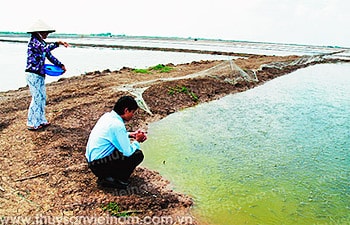Preventing aquaculture diseases in the rainy season
When the weather changes from sunny to rainy and vice versa, the pond temperature will change, causing shrimp and fish to become stressed and shocked, which is an opportunity for many diseases to develop.

Increase food and nutrition for shrimp and fish in the rainy season
- Photo: Tran Ut
Common diseases
When the weather changes from sunny to rainy and vice versa, the pond temperature will change, causing shrimp and fish to become stressed and shocked, which is an opportunity for many diseases to develop.
For catfish, during the rainy season, fish often suffer from diseases such as liver and kidney pus, jaundice. These are dangerous diseases and cause great damage. In addition, there are diseases caused by fungi and parasites.
With farmed shrimp, in the rainy season, shrimp are easily shocked, shrimp bury themselves, digest food and catch prey poorly, and are susceptible to diseases such as bacteria, fungi, white feces disease...
For other freshwater fish species, caged fish and rafts also pose many major risks regarding the environment and disease.
Fix
Comply with the farming season and choose the appropriate time to sow seeds.
Ensure the water level in the pond is at an appropriate level; environmental factors are at a reasonable level, and dissolved oxygen content is adequate. Limit rainwater from flowing into the pond, cage, and raft farming areas.
Lime should be used as a “medicine” that is safe for the environment and livestock. Using lime powder or slaked lime spread on the bank or mixed with water and sprinkled into the pond, hanging lime bags at the head of the flow in the raft will reduce diseases for fish and shrimp.
Removing leftover food, cleaning the feeding area, feeding trays, feeding utensils to prevent mold, etc. will limit the negative effects of leftover food, especially when it rains.
Enhanced nutrition helps animals eat more bait and digest food better. Antibiotics and chemicals can also be an option at this time to prevent and treat diseases that develop during the rainy season at all stages of farmed fish. However, the use of antibiotics and chemicals must strictly comply with regulations on dosage and treatment subjects, especially not using drugs on the banned list.
In addition to preventive measures, at the beginning of the farming season, it is necessary to prepare ponds and lakes carefully; use good, quarantined breeds; raise and stock at moderate density. This is a necessary condition because if the initial pond environment is not good, poor breeds when exposed to environmental changes (heavy, prolonged rain) will be an opportunity for diseases to develop and cause damage to farmers.
According to (ThuysanVietnam) – LC






